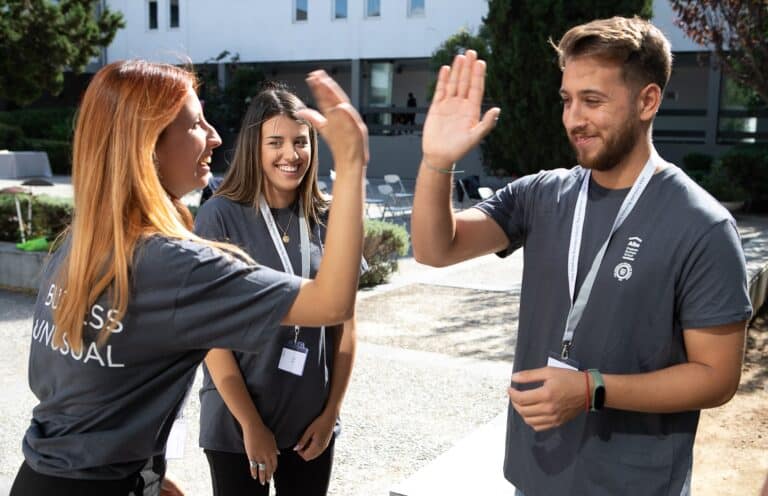Public Speaking Tips for Students
As a student, you’ve undoubtedly done a lot of oral presentations. Being able to talk in public is crucial for almost any professional, but for many reasons, most people struggle with it. If that’s your case, or if you just would like to master your skills, you’re at the right place. We‘ve created an accessible 10-steps guide which will help you to improve your skills and achieve your goals! Get over your fear of public speaking!
[Why Some Students Fail And Other Students Succeed?]
Pick some area or topic that’s interesting for you
If you’re talking about something you’re passionate about, you’re most likely to have more knowledge in that area, and it will be much easier for you to talk about it. Speaking about something you’re interested in also gives you a lot of motivation and allows you to deliver your passion. In case you can’t pick the right topic, try to turn it into something you’ll enjoy the most. Public speaking is always easier if you have control over what you want to talk about.
Study a lot
Even if you think you already have all the information you need, it’s always useful to read some other experts‘ criticism or just gather more information (even though you won’t be using it for your presentation). It might help you to be more systematic and use the appropriate terminology. Don’t forget that you can be asked some questions and they might be tricky to answer.
[Things To Do On A Sunday For A More Productive Week]
Don’t give too much information
Less is more is the golden rule here. In an oral presentation, you’re not supposed to provide the public with all of the information you’ve learned. You have to summarize a lot, focusing on the most relevant parts, and you can always mention where some further details on the topic can be found.
Organizing the information in a certain way will also help your audience to remember the essential parts. Start with some information they might know already or that can be easily related to, then get into the main components and leave the necessary information for the end.
Use some support
Talking in front of the whole audience isn’t the same as speaking in front of the mirror. You can quickly get distracted or nervous, and that can cause you to commit some mistakes or skip some parts. That’s the reason why having an electronic or paper support can save your performance. I recommend having both printed sheet of paper (that you can check if needed) and some visual aid.
You will soon be able to read a new article we’re preparing for you and which will be dedicated to PowerPoint (or any other) presentations, so don’t forget to check our articles section regularly! Public speaking is more than just talking.
[How To Write Better Thesis Statement For Your Essays]
Be creative and adjust to your audience
First of all, you have to know WHO are you dealing with. If it’s your bored classmates, you have to come up with something different, original and interactive which will catch their attention. when you’re talking to little children, it has to be funny, extraordinarily interactive and should include some games. If it’s a group of experts, it should be more academic; you can go higher to the level and use the appropriate terminology (it doesn’t mean you can‘t be original).
Always practice at home and time your presentation
Now that everything’s prepared, it’s the right moment for practising. Do it even if you feel extremely confident about your topic. Having an idea and taking this concept to real life isn’t the same. If you feel less confident or don’t know whether you’re doing well or not, do the presentation in front of a friend or family member and ask them for some feedback.
Also, don’t forget to time your presentation. Use a stopwatch so you can know how long it takes to explain not only the whole presentation but also each part of it. You never know what can happen, you might have to skip some parts. You even don’t want some parts to be concise while others take too long. Also, try to keep your presentation as short as possible. 20 minutes is usually the top.
[The Ultimate Guide For A Great Freshman Year]
Interact with your public
Now we’re getting to the actual presentation. One thing you want to do is to interact with your audience. Ask them questions. Give them samples if you have some. Do some test with them or play a little game (especially if it’s a young audience). They won’t forget your presentation that quickly and they will pay 100% attention from the beginning until the end.
Use your body language in public speaking situations
If you stay still and stare straight at the ceiling the whole time, you won’t be able to connect with your audience. Therefore, even if you made the best project/research/any other work, it won’t have any impact on them. Be confident, maintain eye contact with the public, move around, use your hands or some pointing tool.
[Study Tips For Finals: Why Do You Need To Start Now]
Don’t read!
DO NOT READ. EVER. That’s probably the worst mistake while talking in public. Even if you get nervous without reading, don’t do it, it’s better to screw up a little bit then read the whole thing from the beginning to the end. Besides barely being able to maintain the contact with your audience, it gives them the feeling that you have not prepared your presentation, and you don’t want that.
Speak clearly
Being understood is the most important thing about public speaking. To achieve that, try to avoid some fundamental mistakes in your speech, such as repeating the same stuff again and again or speaking too loudly, too quietly, too fast or too slow. And, the most important, make sure your voice isn’t monotone.
Although we’ve tried to stick to the basics, there are plenty more things you can do to master your oral presentations. It’s just a matter of practice and discovering what works the best for you. We hope that you‘ve found our guide useful and we’d be happy to hear from you in the comments section below, so we encourage you to share your experience with us!
Recent Posts

Although it's possible to sail through university without giving a thought to what you're going to do afterwards - concentrating only on enjoying ...

Ever thought about studying in Greece? Between the sunny weather, incredible history, and breathtaking coastline, you could also get a top business ...

Norway: it's a land of awe-inspiring nature, adrenaline-inducing outdoor sports, and picturesque cities. But have you ever thought about studying ...


